- Home
- Alison Kent
Holiday Kisses: A Rare GiftMistletoe and MargaritasIt's Not Christmas Without YouThis Time Next Year Page 3
Holiday Kisses: A Rare GiftMistletoe and MargaritasIt's Not Christmas Without YouThis Time Next Year Read online
Page 3
Interesting. “So people just drop in?”
“They usually call first, but yeah. I do rounds in the mornings, then the rest of the day I’m usually here.”
“Doing what?”
Never turning his head, he cut his gaze toward her. “Kind of personal, isn’t it?”
Her cheeks warmed as if she’d been sitting for an hour on the hearth. “Sorry. That didn’t come out right. What I meant, was—”
“If I’m out of the service and have no family and no real clinic hours, what do I do with my time?”
She drank from her bottle, realizing first that he’d nailed her intent exactly, and second exactly how nosy her question was. “Yes. That.”
He laughed, a gut-deep chuckle that made her want to curl against him and feel the vibration. Once the thought of doing so settled, she couldn’t shake it. And the beer flowing through her, heavy and thick, only made things worse.
“I keep busy,” he said, pulling her mind from its lusty travels. “I’ve got a good chunk of land here to keep up, and there’s rarely a day someone doesn’t stop by the clinic. I have to go into town to pick up lab results for the tests I can’t do myself. Stuff like that.”
“Do you have help? A nurse or physician’s assistant?”
“It’s just me working with the patients, though the wife of one of my regulars does my accounting and keeps up with the paperwork.”
Very cool. “Sounds like you could give lessons in bartering.”
“It works for me. It wouldn’t for everyone.”
It wouldn’t for anyone needing cash. Which she took to mean he didn’t. “You mentioned doing rounds. Obviously not in a hospital.”
“On the mountain.” He cut her another side-eyed glance. “A big part of how I spend that time you were wondering about.”
“You have that many patients?”
“Rounds aren’t just about patients.”
“How so?”
He took a minute, probably regretting he’d ever rescued her chatty self. “A lot of folks up here are housebound, maybe not sick but not able to get out. Some just don’t want to, but still need a hand now and then. Most knew my dad, and would let him help, so they trust me where they wouldn’t trust social services or a stranger.”
Now that she understood. “Gran plants a bigger garden than one person could ever need for the same reason. She bakes dozens of loaves of bread, and always doubles her casserole recipes and freezes the extra for emergencies.”
“I know,” he said, and finished his beer. “She has me deliver them when she’s not up to getting out.”
His words sent a ripple of unease down Brenna’s spine. “Is she okay? I mean, do I need to be worried about anything? She never complains, you know. And I don’t think she’d tell me if something was really wrong.”
“Nothing to worry about. She’s healthy as a horse. Sharp as a tack.” He got to his feet, waggled his empty bottle by the neck. “Be right back.”
That took care of the physical and mental clichés and left Brenna to wonder about Gran’s emotions. They talked two or three times a week. Sometimes more. Nothing unusual was going on in Gran’s life. Except for one thing.
Dillon returned with two beers, set hers on the coffee table when she showed him she hadn’t finished her first.
“She told you I’m going to Africa.”
“She did,” he said and sat.
“And you disapprove.”
“I didn’t say that. It’s not my place.”
“You didn’t have to.”
He turned to her then, shifting a bent knee onto the couch and looking at her. Looking into her, his eyes lit sharply by the glow of the fire. They weren’t the brown she’d originally thought, but a golden gray, and they saw way too much of what she was thinking.
He glanced down at his bottle, returned his gaze to hers before speaking. “I’m not saying you’re doing anything wrong. I just think it’s going to be tougher than you realize to leave her behind.”
Brenna fought the urge to jump to her feet, to leave the room and escape his words that felt like an accusation. That sort of defensive response would do nothing but prove him right. Already she was bracing herself for the guilt to come, the sorrow.
The longing to be in Gran’s arms, to smell the butterscotch and roses. “I’m not leaving her behind. I’m doing exactly what she did, what she was doing, volunteering, when she met my grandfather. He was a doctor, you know.”
“And she was a nurse. She’s told me.”
Again, with his knowing things about her and hers. “My folks are doing the same now. I’m just following in the family footsteps, and I’m doing it with her blessing.”
He nodded, his eyes on the fire again. “My dad gave me the same blessing when I gave up my practice to enlist.”
“Then you know firsthand what it’s like to make that kind of career choice.”
Several seconds passed before he gave her a response. “I also know how tough it was to be seven thousand miles away when Dad’s heart gave out.”
Anger began to bubble in her blood but she stayed silent, unsure of the root of the emotion—his words, or her life’s dream taking her away from Gran. The way their same dream had taken her parents from her.
She’d been fine with their going. She’d been eighteen, independent. And she’d be just as fine now…Wouldn’t she? “I’m sorry that happened. To you and to him.”
Dillon shrugged, took a long drink from his bottle, said nothing.
“At least I won’t be in a war zone.”
“The health conditions where you’re going? Call it another kind of war. And you’ll be fighting it eight thousand miles away.”
So her extra thousand made a difference? “I live four hours from Gran now. If her heart gives out, I’m already too far away. And if you’d still been practicing medicine in the States instead of saving lives overseas…”
She stopped. His life wasn’t her business. And making him feel worse would not make her feel better. Besides, it was wrongheaded and rude.
He sat forward then, his elbows on his knees, his hands between holding his beer, his head hung low. “I’ve told myself the same thing dozens of times. I don’t know why it won’t stick.”
She thought of her struggles with leaving Gran. Then realized this wasn’t all about her. That Dillon Craig, soldier, warrior, doctor, savior, shared her doubts.
Setting the rest of her beer on the table, she got to her feet. She was done for the night. Done doubting, done worrying, done letting guilt win. Done upsetting her very generous host because she still had issues.
At the door to the bedroom, she turned. “Maybe it’s really not about the miles. Maybe it’s not being sure we’re doing the right thing.”
Long after Brenna had turned in, Dillon was still sitting in front of the fire thinking about what she’d said. About making choices. About doing the right thing.
He knew without a doubt that serving his country had been a calling he had to answer. He didn’t think he’d ever seen such pride in his father’s eyes as when he’d stood with the rest of the military families seeing their loved ones off to war.
Brenna was right. It wasn’t the miles as much as the choices. And he’d made some while in Afghanistan that had repercussions he’d live with the rest of his life.
No man left behind. And none had been. That didn’t mean he hadn’t had to choose who to save, and who to let go. Those were the faces he saw daily, faces he couldn’t shake. Faces that would haunt him no matter how many others owed him their lives.
He wasn’t looking for kudos or credit. What he wanted was to know he’d done his best, done all he could, the only things he could. To know that one extra step wouldn’t have made a difference. That no family was suffering needlessly because he’d made a mistake.
From his bedroom came the sound of Brenna coughing. He frowned, listened closer, heard nothing else. He hadn’t yet decided if she was the woman he’d expected after all of
her grandmother’s stories. Mostly because he hadn’t known what to expect. Grandmothers had a way of sugar-coating even the tiniest of flaws.
So far, he hadn’t found any. She was girl-next-door cute but bedroom-eyes sexy. She was smart, sharp. She challenged him, and he liked that most of all. But he meant every word he’d told her. Leaving loved ones behind for a career move didn’t come easy.
At least she wouldn’t have to deal with the life-and-death battlefield choices that still had him questioning if his move had done more harm than good.
Chapter Four
The first thing Brenna did when she woke the next morning was remind herself it was Friday, and Christmas was now three days away. The second thing she did was climb shivering from bed to pull back the curtains and check on the snow. The third thing she did was groan.
The drifts mounded against the house were indecipherable from those circling the trunks of the surrounding trees, creating one very wide and still deepening blanket. Or so she supposed was happening since she couldn’t see much beyond her reflection in the glass.
She dropped the curtain into place, turned back to the room and clicked on the bedside lamp. The shade was an ordinary pleated linen in a color between eggshell and cream, but the base, a section of knotted tree branch housing the socket and wires, was obviously one of a kind, fitting in with what she’d seen of the rest of Dillon’s décor.
She lifted it, turned it over, found a set of initials—W.T.—and a date—3/25/2007—burned into the bottom. But before she could think about what either meant, the smell of coffee wafted in from the kitchen, and her stomach growled.
After a quick shower in the bedroom’s attached bath, she dressed in the same clothes she’d put on when leaving Raleigh yesterday. Minus a comb or brush, there was nothing but her fingers to run through her hair, though she did help herself to a new toothbrush, along with Dillon’s toothpaste and soap.
She really needed her things. Especially if she was going to be stuck here for the next couple of days. It was bad enough that she’d driven him from his bed and would be sharing what food he’d laid in store. She didn’t feel right using his toiletries, or asking if she could borrow a pair of pajamas so she could wash her things.
Still imagining the overlarge fit of his clothes—the hems of his bottoms rolled up to her ankles, the sleeves cuffed to her wrists, his scent of leather and pine enveloping her—she left the bedroom to find herself alone. A fire still blazed in the main room, and the pillow and blankets left rumpled on the sofa gave her another twinge of guilt.
Tonight, she slept there, Dillon in his bed. Hospitality didn’t need to mean he sacrificed his comfort for hers, and she would fit the sofa better.
In the kitchen, the coffee was hot, and a cup sat on the counter next to the pot, but Dillon wasn’t around. Now that dawn had given way to daylight, the window over the sink allowed for a better view of the storm. She sipped her coffee, noticing the wind had died to more breeze and less bluster. Snow flurried in soft swirls, tempting her outside to see how bad things were.
When she got to the rack where Dillon had hung her coat, she found her purse, her suitcase and her carryall of gifts sitting just inside the front door. She stared, confused, disbelieving, but curious most of all. Yes, she appreciated the gesture. But if he could make the trip to her car for her things, why couldn’t he get her to Gran’s?
Wanting an answer, she dug through her bag for her boots and a knit hat, grabbed her coat and her coffee and headed onto the porch. White powder had already begun to stake its claim on the recently swept boards. And the passage cleared from the steps around the cabin proved Dillon had been busy long before the sun had come up.
Pulling her hat low on her forehead, she cradled her mug to her chest and ducked into the wind. The path circled the cabin then branched in two directions. She couldn’t see anything but trees and snow to the left, but the right leg dead-ended at a barn. A row of high windows shining brightly drew her that direction.
Packed snow crunched under her feet, but above the wind and the sound of her steps, she heard that of a motor grinding. The barn’s main entrance was braced and bolted, but a sliver of light escaped from a door on the structure’s side. She let herself in and eased the door closed behind her.
Breathing in the sharp pitch of pine, and those of burning wood, horseflesh and hay, she made her way around tables and tool chests and shelves of supplies—paint, stain, planes and chisels and knives—before she found Dillon. And then she stopped because the scene before her was so unexpected, she lost her bearings.
The largest part of the building was, indeed, a barn, and Dillon’s horse happily feeding in his stall. A fan blew a stream of warmth along the floor, keeping the worst of the chill at bay. She set her coffee on the ledge of an empty stall, shrugged off her coat and draped it over the door. Then she headed for Dillon.
Boughs of pine needles and wood scraps and shredded bark lay on a table where he stood working with a section of tree branch. Without seeing more than that, she knew she was looking at the artist who’d created the lamp. Deducing that much didn’t explain the initials or the date. In 2007, he’d still been overseas.
He hadn’t acknowledged her presence, but she was pretty sure he knew she was there. Sure, too, that he wished she wasn’t. He’d stiffened a bit, his shoulders, his back, the tilt of his head, and his hands had stilled, as had the air around them.
“Thanks for getting my things from my car.” She said it to break the strangely uncomfortable silence, but also because she meant it. And because she wanted to broach the subject of his taking her to Gran’s.
But that part she held off on. His stance told her it wasn’t the right time. And when he finally turned from his work to face her, she knew hunting him down this way had been a mistake.
His face appeared ragged, as if he hadn’t slept at all, and tortured, as if he’d been lost in a world she couldn’t imagine. His eyes conveyed a sadness she swore hadn’t been there previously. Swore, too, that the tight set of his mouth was all that kept the corners from turning down in a sorrow too deep to bear.
She didn’t need to be here. She shouldn’t have come here. She had to go, to leave him. Looking away, she reached for her coat. “I just wanted to say that. I didn’t mean to intrude.”
Three heavy steps brought him to her, and he grabbed her arm to keep her from walking out of the warm barn and back into the frigid morning. “Wait.”
His hold was firm and gave her little choice. She stared at his hand, the hand of a stranger, a man much larger than her, a warrior who’d been damaged, and realized she wasn’t frightened at all. Instead, compassion coiled in her center, and she did as he said.
Long, tense moments passed, the roar of the fan and the whiffling of Ranger feeding filled the air that seemed too thick to breathe. Brenna couldn’t blink, she couldn’t move. She could only wait for Dillon to shake his demon’s grip.
“You’re not intruding,” he finally said and released her, returning to the table and giving her his back. “I should’ve left you a note, told you where I was. I didn’t think.”
He wasn’t used to leaving notes, she thought, rubbing at her arm. She got that. He hadn’t expected her to come looking for him. She got that, too. What she didn’t get was what seeing him like this, hurting, had done to her, because without question it had changed everything about her reason for being here.
Why she was less concerned about getting to Gran’s than she was with talking him off whatever ledge had him suffering alone?
“It’s not a big deal.” Striving to appear unaffected, she fetched her coffee, sipped at the brew that was lukewarm at best. “I was just excited to see my things and thought I’d ask you how my car is faring.”
“Not too bad considering the driver’s window was down all night.”
“Crud. I hadn’t even thought about the wet mess inside.”
“It’s wet, and it’s a mess, but the airbag collected a lot of the snow. I r
olled it up.”
“I’d been planning to sell it before my move, but I wonder if it’s going to be worth the cost to repair.” Another swallow and her coffee was gone. She was also running out of conversation. “Really, though. I wasn’t expecting that, so thank you.”
“You’re welcome.” He pulled open a drawer in his table, stored away several saw blades. “I needed to clear the road to the clinic while there was a break in the storm, so made the trip down to your car with the tractor.”
“Ah, I thought you went on horseback.” And so much for her getting to Gran’s the same way. “That must’ve taken a while. A tractor.”
“I couldn’t sleep.” He picked up an awl, gave a gritty, humorless laugh. “Not that me not sleeping is anything new.”
He’d said the words to himself, not to her, and she wondered if he knew he’d spoken them aloud, or if he was so wrapped up with his internal battles he’d forgotten for the moment she was there.
Eyes closed, she breathed a soft sigh. This wasn’t her business. He was barely even a friend. Yet he was Gran’s friend, and obviously a close one. Gran never let a hurt go uncared for, and had instilled in Brenna the same.
“Maybe you should see a doctor about that. The no sleeping thing.”
“Yeah, well, if I knew one who had a clue what he was doing I might.”
Her comment had been lighthearted, offhand, but his response… She was no good at this. She bandaged cuts and scrapes and gave injections and packed sprains in ice. She wasn’t Gran who knew how to soothe, how to pull out deep-rooted poisons with words. And staring into her empty cup wasn’t giving her an answer.
She returned the cup to the stall’s railing, tucked her hands into her pockets and walked toward the table where Dillon stood. “I guess it’s like the cobbler’s kids who don’t have any shoes.”
He looked over at her then, his smile not quite reaching his eyes, though the bleakness had faded to what looked like acceptance. “Yeah. Something like that.”

 Beneath the Patchwork Moon (A Hope Springs Novel Book 2)
Beneath the Patchwork Moon (A Hope Springs Novel Book 2) The Second Chance Café (A Hope Springs Novel Book 1)
The Second Chance Café (A Hope Springs Novel Book 1) The Sweetness of Honey (A Hope Springs Novel Book 3)
The Sweetness of Honey (A Hope Springs Novel Book 3) The You I've Come To Know (A Mother's Love Book 1)
The You I've Come To Know (A Mother's Love Book 1) The You I'll Love Forever
The You I'll Love Forever Abbot
Abbot The You I Want For Life (A Mother's Love Book 2)
The You I Want For Life (A Mother's Love Book 2) The You I've Come to Know
The You I've Come to Know The Comfort of Favorite Things (A Hope Springs Novel Book 5)
The Comfort of Favorite Things (A Hope Springs Novel Book 5) The You I Want for Life
The You I Want for Life Hope for the Holidays: a Christmas novella (A Hope Springs Novel Book 6)
Hope for the Holidays: a Christmas novella (A Hope Springs Novel Book 6) Bliss and the Art of Forever (A Hope Springs Novel Book 4)
Bliss and the Art of Forever (A Hope Springs Novel Book 4) Play Me (Barnes Brothers Book 2)
Play Me (Barnes Brothers Book 2) No Limits
No Limits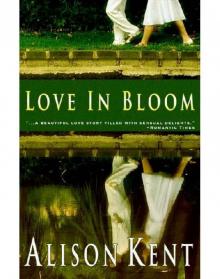 Love in Bloom
Love in Bloom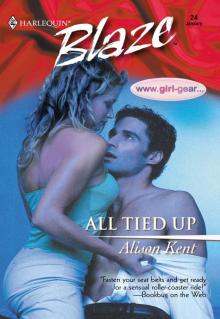 All Tied Up
All Tied Up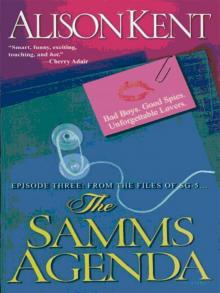 The Samms Agenda
The Samms Agenda The Second Chance Café
The Second Chance Café One-Click Buy: March 2009 Harlequin Blaze
One-Click Buy: March 2009 Harlequin Blaze BOUND TO HAPPEN
BOUND TO HAPPEN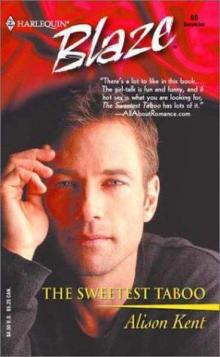 The Sweetest Taboo
The Sweetest Taboo The Second Chance Café (A Hope Springs Novel)
The Second Chance Café (A Hope Springs Novel) Undeniable
Undeniable Striptease
Striptease The Bane Affair
The Bane Affair At His Mercy
At His Mercy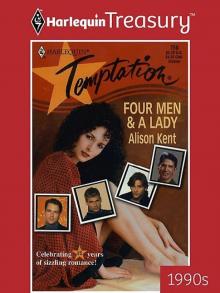 Four Men & A Lady
Four Men & A Lady The Comfort of Favorite Things (A Hope Springs Novel)
The Comfort of Favorite Things (A Hope Springs Novel) Unforgettable (The Dalton Gang #3)
Unforgettable (The Dalton Gang #3) Goes down easy: Roped into romance
Goes down easy: Roped into romance Holiday Kisses: A Rare GiftMistletoe and MargaritasIt's Not Christmas Without YouThis Time Next Year
Holiday Kisses: A Rare GiftMistletoe and MargaritasIt's Not Christmas Without YouThis Time Next Year No strings attached
No strings attached Playing Love's Odds (A Classic Sexy Romantic Suspense)
Playing Love's Odds (A Classic Sexy Romantic Suspense) Unbreakable
Unbreakable Red Hot Holiday Bundle
Red Hot Holiday Bundle Kiss & Makeup
Kiss & Makeup The Shaughnessey Accord
The Shaughnessey Accord Larger Than Life
Larger Than Life Call Me: sold live on CBS 48 Hours (Barnes Brothers Book 1)
Call Me: sold live on CBS 48 Hours (Barnes Brothers Book 1) With Extreme Pleasure
With Extreme Pleasure The Beach Alibi
The Beach Alibi Indiscreet
Indiscreet The Sweetness of Honey (A Hope Springs Novel)
The Sweetness of Honey (A Hope Springs Novel) Maximum Exposure
Maximum Exposure